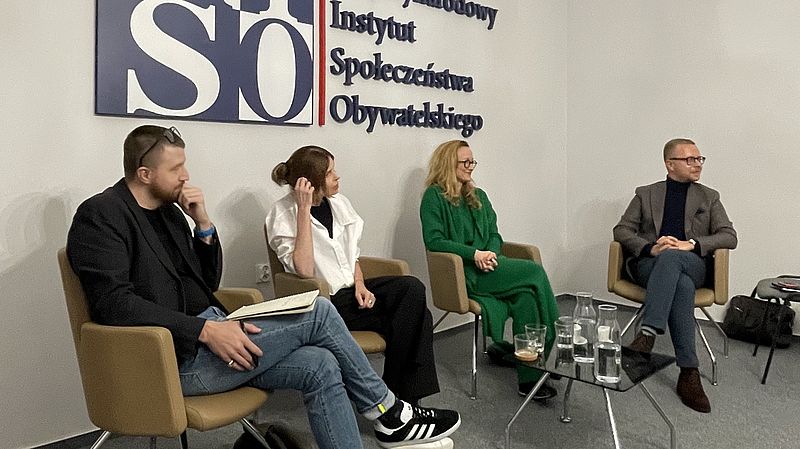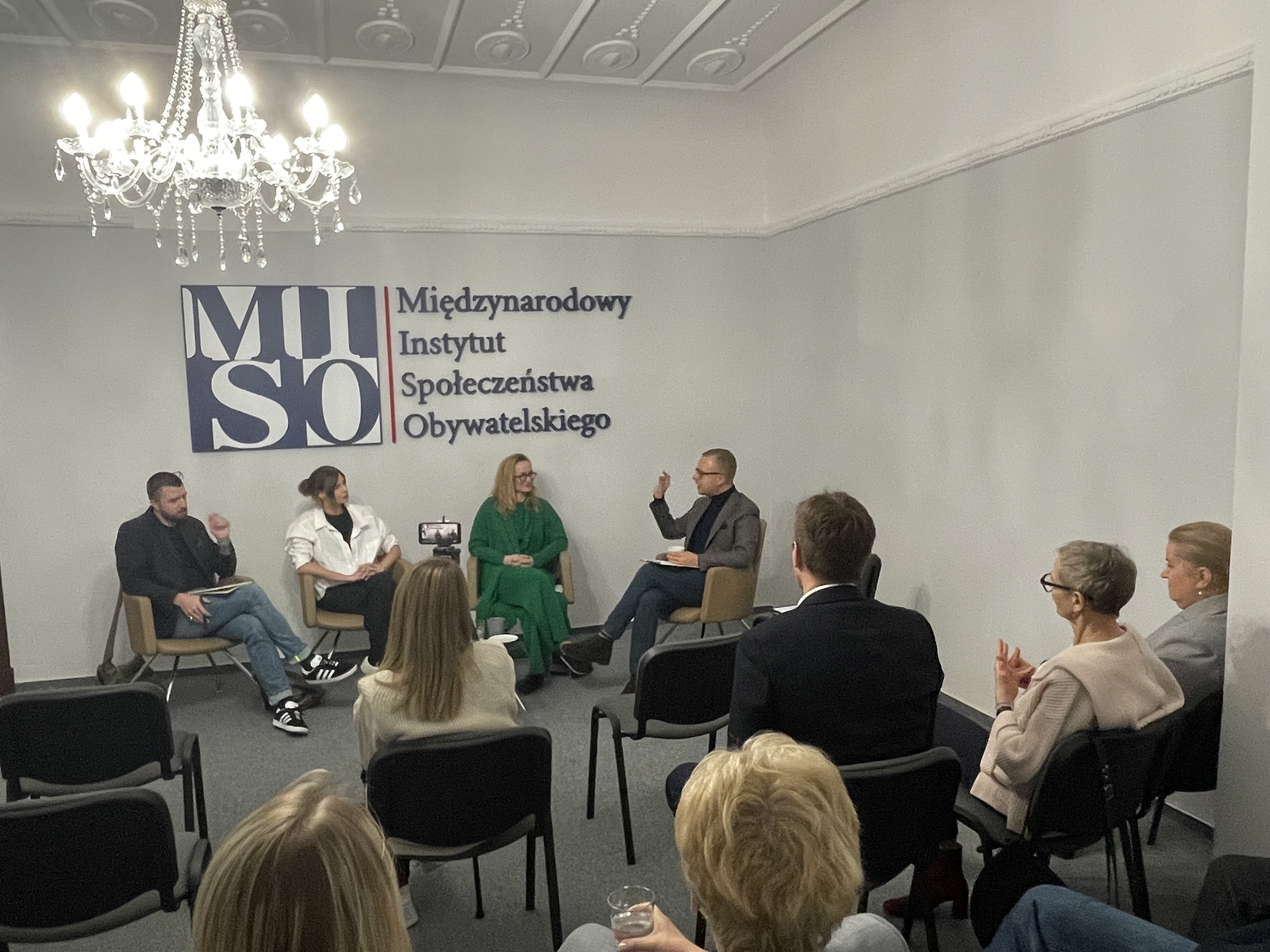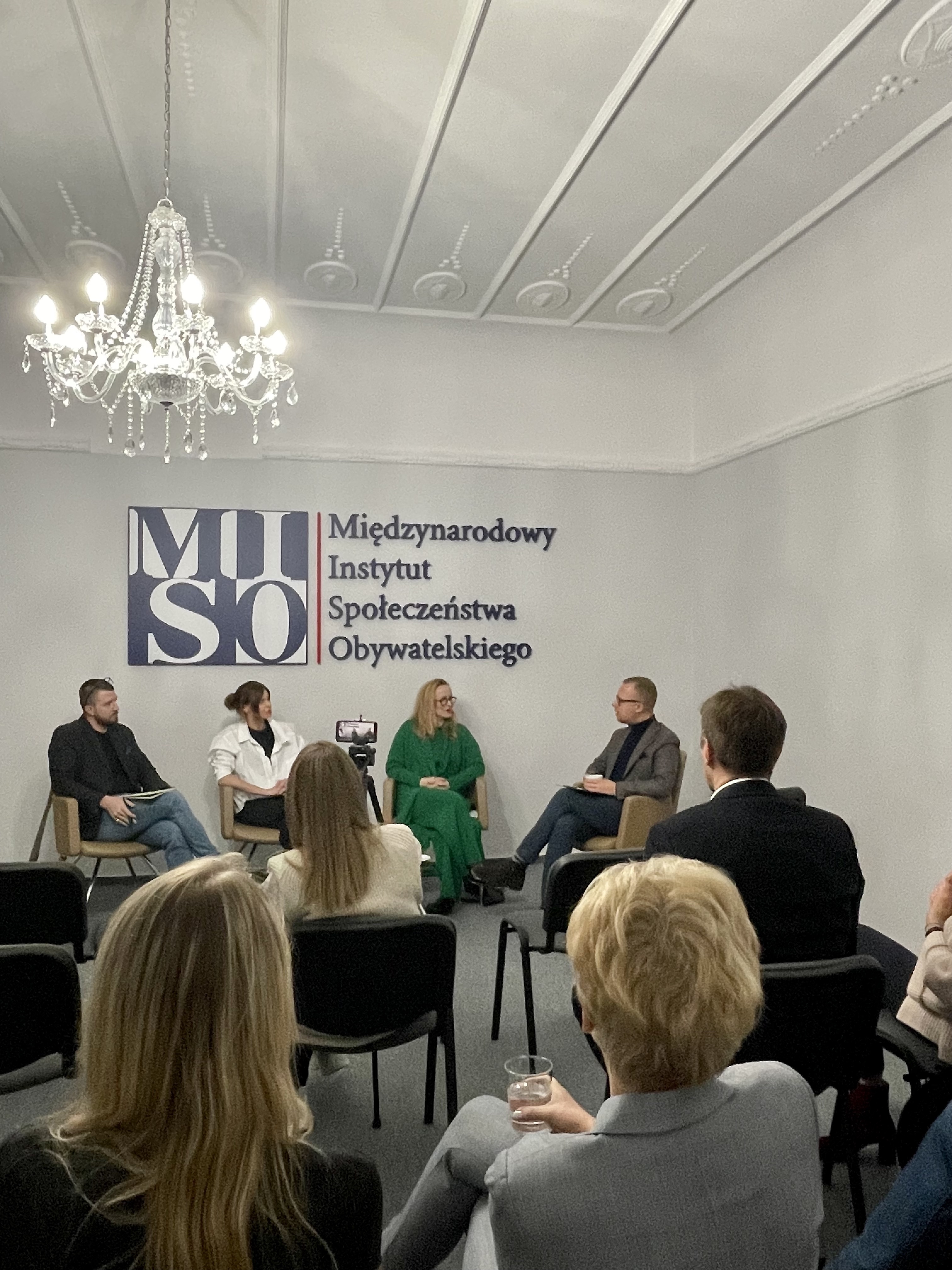Who Is to Draw Crowds? Role of Artists in Building Civil Society
The meeting was attended by the speakers Renata Gabryjelska (director, actress, model), Dr. Aleksandra Hirszfeld (philosopher, founder of the “Enthusiasts” initiative) and Piotr Łapinski (photographer, activist). The moderator of the debate was Marcin Hinz (cultural anthropologist, MISO associate).
The involvement of artists in the construction of civil society was not a steady and uniform process. The turn of 1989/1990 was the moment when artists felt that they should be involved in society and began to step out of their role, in a way. In the following years, art began to be disconnected from social life, recognizing that engaged art was more a faction of journalism than true artistry. It was only after the political changes of 2015 that artists began to become more intensely involved in social issues again.
Renata Gabryjelska depicted an impulse to action attracting crowds as a story. According to her, without a constructed narrative there are no societies. Each country has its own narrative, myths, tales, but it would be good for the narrative to be understandable and logical. At the beginning of the 20th century, world elites created three main narratives - fascist, communist and liberal. World War II virtually eliminated fascism, and in the late 1940s a struggle began between the communist and liberal narratives. - The main value in the liberal narrative that mobilized artists was freedom. People were given an opportunity to express their emotions. They wanted to identify themselves with that new value. However, after the 2008 crisis, the then narrative began to disappoint. Freedom was replaced by building a sense of security - the speaker said.
A subsequent historical point was the year 2016 with Brexit and Donald Trump's rise to power. It turned out that a very large part of the public welcomed a national and hierarchical narrative. All the changes are leading to speculations about whether the liberal narrative is still the global narrative we should continue, and who should be responsible for creating a new story? - The world, especially after the pandemic, is full of chaos, and we need a new, coherent narrative that will pull people globally and that they will fully believe in – R. Gabryjelska said. According to her, the first stage is to create a universal story, and then comes the search for a protagonist who will drive the story throughout the narrative. This is also how civil society creation should be thought of nowadays.
Aleksandra Hirszfeld, on the other hand, wondered what the process of building a civil society should consist of in. And whether it was precisely artists who should spearhead social revolutions. She stated that she herself felt that as an artist she had the tools to create that narrative, but did not have enough publicity to reach and move the crowds. - Social changes and civil society require a narrative based on awakening. It's not a matter of creating awareness-raising projects, but the actions need to be at a deeper level, to convince people of their own empowerment. There is a lack of feeling in society that we are still able to change anything and what tools we should use to do so.
The originator of the “Enthusiasts” initiative stressed that we are now in a situation where people are no longer coping with reality. - We are currently in a unique, unrepeatable moment of human development, because never have we faced as many cataclysms and crises as today - the philosopher stressed. She also said that concrete solutions and firm actions were what people needed in this unique situation full of uncertainty.
Speaking about contemporary leaders who are needed, she stated that it would be necessary to reach out to the competencies classically associated with women - the so-called soft competencies. According to the philosopher, among leaders there is a lack of people who are empathetic and able to listen to societies and determine what specific areas would require action.
Piotr Łapinski stressed that as regards social engagement, the idea is more important than the very individual. - To look out for a leader is to take responsibility off ourselves. We keep waiting for someone to pull us, instead of acting ourselves – the photographer said. He argued that civil society is not built from the top down, with changes on a macro scale, but with grassroots work in the immediate environment. Before it becomes “civic,” the society must awaken community. To co-create a community, one must be open to compromise, and today society is more polarized than ever. - There is no dialogue, no flow of ideas. We live in concrete-walled silos and no flow works. This is also rooted in the media, as from pure journalism it has become increasingly identity-driven - Piotr Łapinski noted.
The participants in the discussion then moved on to the concept of the causality of art. Dr. Hirszfeld said that currently public debates revolve a lot around the question of identity. She pointed out that there is a game about whether an individual who builds his or her own identity is also able to build his or her own sense of empowerment. - Politicians are keen to cut off our wings and show us that we are fully dependent on them. People need to believe that change is possible depending on how much they feel their own power – Aleksandra Hirszfeld said. She also stressed that the younger generation is much more vulnerable, and only by reworking generational traumas can the society move forward.
From Renata Gabryjelska's point of view, change is possible after redefining the whole concept of democracy. - It is worth considering whether democracy in its current form is not an outdated system and should be adapted to modern changes, to build an enlightened democracy – Renata Gabryjelska said.
Piotr Łapiński countered that statement by stressing that without informed individuals, society is unable to create a new vision of democracy. - What interest would the global elites have in developing a new system that could work against them? All ideas were not created by rulers, but by philosophers. I would not expect radical changes by the leaders, as they are the biggest beneficiaries of today's system – P. Łapiński alluded.
The speakers asked an open question - who, then, should redefine the system? According to Aleksandra Hirszfeld, it is society at the level of everyone that should answer the question of who he/she is and what he/she wants.
In the next part of the debate, we talked about how important small changes were. Aleksandra Hirszfeld spoke about her “Enthusiasts” project, which brings together women who work in their local environment and change their communities with small steps. Work at the grassroots is the most important. That work does not always have to be done by an artist. We are lacking people who think communally. Nowadays, if you're not at least a bit of a narcissist, it's very difficult to survive - Hirszfeld said. We need people who can, in a way, go beyond the omnipresent narcissism and think about creating a community outside the system. As in the “Enthusiasts” project, where 100 diverse women came together, united by the need to activate the society.
Piotr Łapiński spoke about banners being photographed by him at numerous protests and marches. - The phenomenon of the evolution of banners is remarkable. There is a reason why they are now going to the Museum of Modern Art – P. Łapiński said. Although their owners do not think of them as an art form now of their creation, however they are undoubtedly becoming art and an artistic activity.
During the political transition, the art world voiced its worldview, but for the next 20 years the worlds of politics and art have been separated. Only in the last few years have artists begun to get engaged in a political debate again. - We live in an era where one must take a stance. It is no longer possible to stand on the sidelines and think that I am not affected - the photographer noted.
Another aspect raised during the debate was the crisis of authority. Aleksandra Hirszfeld stressed that influencers' stepping outside of their business shows that currently, everyone needs to have their opinions and articulate them. - More and more influencers who gained popularity through the non-socially engaged path are now using their potential to build specific narratives - Hirszfeld said. Piotr Łapinski added that these days an idea has the possibility to break through only by using an element of surprise. In his opinion, this action can quickly run out of steam, and in a world where everyone talks about everything the devaluation of authority will be even more profound. Renata Gabryjelska, on the other hand, said that any activity from any influencer with a large following expands awareness. - Who should be the hero of our times? - R. Gabryjelska asked an open question. For that position, Dr. Hirszfeld suggested male and female activists, Renata Gabryjelska suggested immigrants, and Piotr Łapiński put forward a thesis that it would be better to talk about ideas and values rather than specific individuals.
Culture today is becoming identity based. We live in times when one's identity needs to be redefined. Young people today do not want to talk about sexuality in such a way as it was discussed years ago. They don't focus on what is feminine and what is masculine, they draw from both sides. Aleksandra Hirszfeld acknowledged that while working on Enthusiasts she understood that it was not important whether they were women or men, but what direction they were heading to.
The role of artists in building civil society is to bridge the dissonance and reduce the distance between people. This can only be achieved through grassroots work and the involvement of individuals. Gabryjelska stressed that concretization was important. Showing people how a given change will affect their daily lives. Generalizing can be perceived as an abstraction. In turn, Dr. Hirszfeld felt that to initiate change, individuals, through education, had to acquire the necessary skills, tools, such as critical thinking.
Democracy, the global narrative, the meaning and role of authorities - these and several other issues therefore need redefinition, according to our speakers. In this process there is also a place for artists, who should go beyond strictly artistic activities. On the other hand, any change is possible only when we start working at the grassroots. Everything starts with small steps. From local communities. From ourselves.




